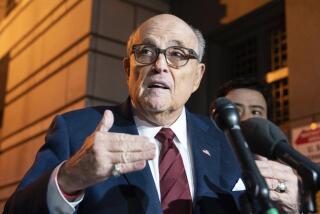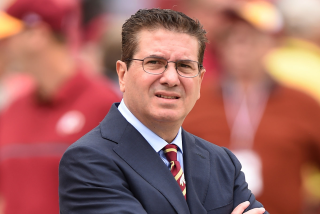Gov. Snyder says he ‘worked diligently’ to avoid Detroit bankruptcy

Protesters gather outside Detroit federal court during bankruptcy proceedings.
- Share via
DETROIT — As protesters marched outside, Michigan Gov. Rick Snyder testified in federal court Monday that he “worked very diligently” to avoid Detroit’s historic bankruptcy as attorneys for employee unions and retirees grilled him on decision-making prior to the July filing.
Snyder appeared on the fourth day of trial before Judge Steven Rhodes, who must determine whether the city and state officials — including the governor and his appointed emergency manager, Kevyn Orr — negotiated in good faith with creditors and did all that they could to avoid filing for Chapter 9 bankruptcy protection.
His decision will determine whether the Motor City’s bankruptcy case — the largest in U.S. history — can move forward.
Pension funds and employee unions have said Snyder appointed Orr specifically to take the city through bankruptcy, without negotiating with unions beforehand to avoid Chapter 9. Orr has said the pension funds are $3.5 billion short and he also wants to cuts health benefits negotiated in the past.
The July bankruptcy filing came as Detroit faced about $18 billion in debt, its municipal services, including police and fire departments, were sorely inadequate and its urban core was racked by high crime and widespread blight.
In court, attorneys questioned Snyder on his discussions with Orr about the city’s increasingly troubled finances and how they planned to handle pension obligations if bankruptcy were declared.
Snyder was mostly patient as a series of lawyers asked complex questions.
“If you look at difficult problems around the country, this is a problem that’s been acuminated for 60 years and has not been solved before,” Snyder said. “There are not many problems of this magnitude in this country.”
One of the key issues is the March appointment of Orr, who helped lead Chrysler through bankruptcy in 2009. Snyder testified that he interviewed at least one other candidate besides Orr, implying that he did not just appoint Orr to declare bankruptcy. It was a point he tried to emphasize over and over.
“I worked very diligently to avoid this process,” he said.
Much of the questioning focused on what will happen to pensions of city employees if the bankruptcy moves forward, and what the governor and Orr had discussed about this issue before July.
When asked the degree to which he and Orr had discussed pension cuts, Snyder said he didn’t recall. That prompted some shouts of “liar” from the crowd of about 40 sitting in an overflow room watching the proceedings on closed-circuit television. Snyder also said he did not necessarily think that pension cuts had to be part of the bankruptcy plan.
A letter to the governor entered as evidence in trial indicates that his legal counsel, Mike Gadola, advised him that he could put conditions in the bankruptcy protecting pension benefits. But no such conditions were included in the filing because Snyder said he was trying to avoid delays in the trial.
Snyder testified that he viewed a proposal to creditors in June as a preliminary document that could later be negotiated.
At least 100 creditors, including those holding city bonds, are among those opposing the city’s request for bankruptcy protection.
Much of what Orr and Snyder discussed about pensions was not detailed in the testimony. Because lawyers were present in some of their meetings, Snyder cited attorney-client privilege. This response frustrated many in the courtroom, as well as pension lawyers.
Michael Nicholson, a lawyer for United Autoworkers, said Snyder was “hiding the truth” by invoking attorney-client privilege.
“Let’s hear what they had to say behind closed doors about gutting people’s pensions,” he said to a crowd of reporters after the day’s testimony had concluded.
During the proceedings, protesters gathered outside the downtown Detroit courthouse, carrying signs showing Snyder with devil’s horns and shouting “Hey, hey, ho, ho, Gov. Snyder’s got to go.”
Those watching the afternoon’s proceedings from the overflow courtroom sometimes scoffed at Snyder’s testimony that he was trying to do the best thing for the 700,000 citizens of Detroit, as well as his frequent answers of “I don’t recall.”
Pastor W. J. Rideout, one of those watching the bankruptcy proceedings, shook his head at some of Snyder’s answers.
“This is just a circus -- he does not care about city residents,” Rideout said, “He’s a lawyer, he’s avoiding all the questions.”
ALSO:
Anti-bullying videos questioned after two students’ suicides
Brooklyn slayings: Neighbors say victims’ relative struggled in U.S.
Phoenix shooting: Family of four killed by neighbor, police say
More to Read
Sign up for Essential California
The most important California stories and recommendations in your inbox every morning.
You may occasionally receive promotional content from the Los Angeles Times.











